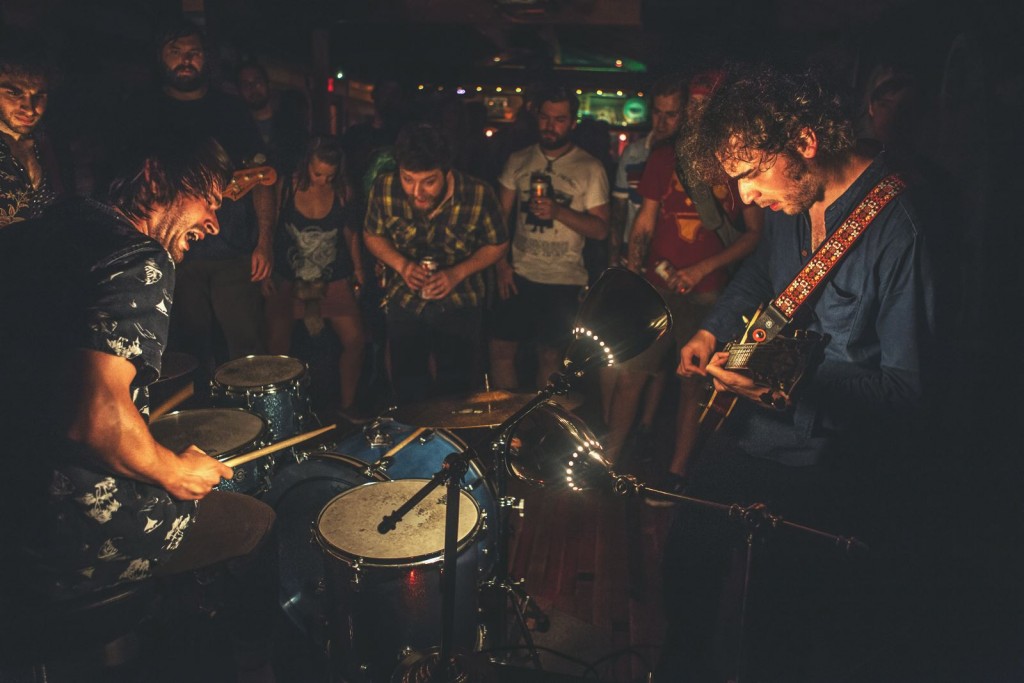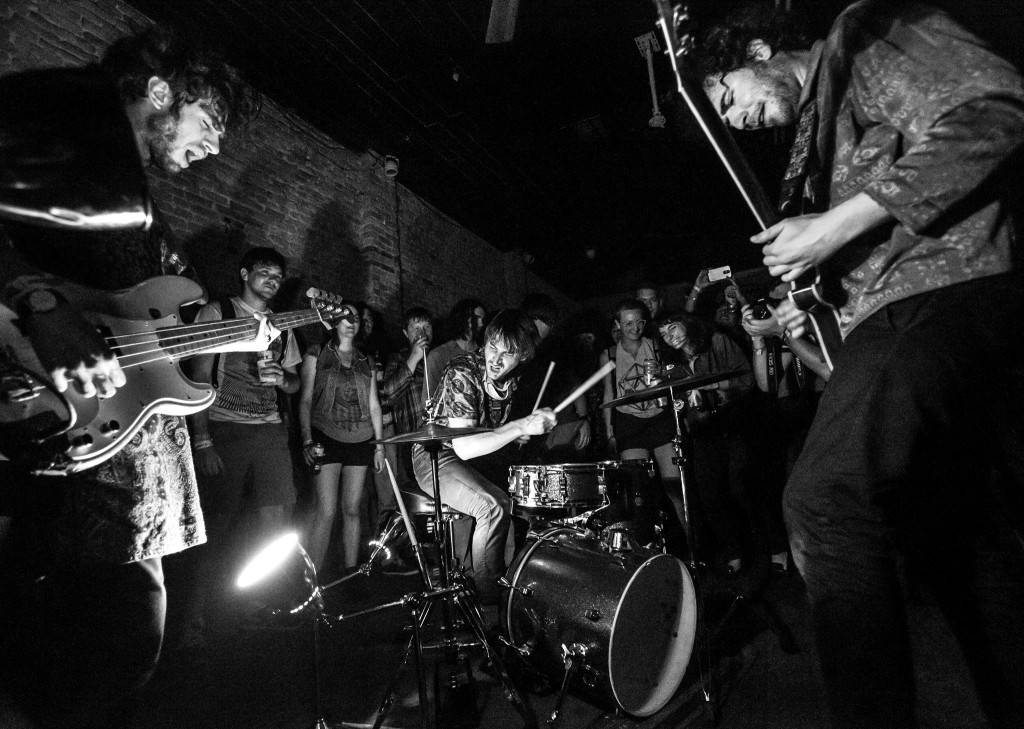Culture
Discussing A Lack Of Studio Trickery With Yonatan Gat
By: Emily Votaw
Posted on:
One of the founders of Tel Aviv-based sound rock act Monotonix, Yonatan Gat has played over 1,500 live rock shows over the course of the past 10 years, bringing his electrifying stage presence and undeniably unique guitar “voice” to more than 50 countries on five different continents. Monotonix became known for shows that were so rowdy and strange that they were banned from playing many venues in their home country by the time the members disbanded in 2011.
After Monotonix ceased to be, Gat recorded and released his solo debut EP in 2014, entitled Iberian Passage. Ever since Gat has been touring the world almost non-stop, unveiling his second EP, Physical Copy just last year on Joyful Noise Records.
Sept. 7 Gat will play The Union with his touring band (including drummer Gal Lazer, who’s name is alongside Gat’s as the primary artist behind Physical Copy.) and earlier this week, WOUB’s Emily Votaw had the opportunity to speak to Gat about working with legendary producer Steve Albini (Big Black, Rapeman, Shellac, Pegboy), the ephemeral nature of a live musical performance and what it really means to get up close and personal with one’s fans.

WOUB: Could you tell me about working on your most recent release, Physical Copy with producer Steve Albini?
Yonatan Gat: If you look at the cover of that record, it is actually credited to both myself and my drummer, Gal Lazer. He’s the drummer in my touring band and he participated in recording my last LP and the next LP, which will come out next year. He’s a great musician in his own right, so we ended up making this record as a more collaborative effort because the sound relies heavily on his grooves. Usually my records rely really, really heavily on editing and alterations in the studio. I’m known for doctoring them up, changing up the structure of a song. We hear songs that are just verse, chorus, verse, chorus, and I figured that the best way to f*ck that up is to use heavy digital editing. I was drooping music into a computer and doing some really horrible things to it. I’d be creating this alien that doesn’t even sound like a song, it sounds like something else. I’d get field recordings and do a bunch of wacky stuff with it. Physical Copy was about trying to do that in the way we play the music and not really using studio trickery, which is a lot of what people like about our records. So with Physical Copy we just recorded some really intense songs that became insanely busy. I wanted Steve Albini because he’s really good at getting that gigantic sound I wanted. We based the songs on some tapes and improvised in the studio, did whatever would work. So we didn’t really have the songs when we went into the studio. I find that bands tend to play songs better and be more excited about the music when it’s new to them, and for that reason we didn’t have many songs written before we went into the studio, only maybe one or two. And the rest we improvised on the spot. We got in, set up within an hour because Albini works very fast. Then we took two and a half, maybe three hours and executed the music in short minute-and-a-half bursts, which is about the length of every song. Then we edited them together like a mixed tape, they just kind of dissolve in and out into each other. Physical Copy is what we would usually do with our records through editing. It’s just the three of us playing in the studio, no overdubs, no tricks.
WOUB: Producing a record like that would take some really precise musicianship. Do you feel like that’s something you’ve honed with your non-stop touring?
YG: Yeah, I’m not the kind of musician who likes to practice at home for seven hours a day. I play at home a lot and I compose at home, but most of what I learn was from playing thousands of shows, I’ve probably played around 1,500 shows at least on the guitar at this point. Aside from that I didn’t intend to be “a guitarist”, I just used the guitar to say what I had to say and eventually when I played a lot of shows it became a big part of what I am associated with.
WOUB: Could you tell me a little about your touring line-up? I believe it’s just a three-piece, is that correct?
YG: It is just the three of us, but we make a lot of noise. I play guitar and Sergio Sayeg plays bass and Gal Lazer plays drums. Mostly we’re doing one thing at a time, but sometimes I stop playing guitar and I sing a little bit. But most of the time I play guitar and we improvise and the music we play every night is different. So if somebody comes to our show in Athens they will see something that has never happened before and will never be done again. We don’t use setlists and we don’t have a structure for a show, it something that just developed organically as we’ve played around 300 shows over the past year or so across the world. Anything goes and anything could happen. We play inside the audience. We like to be there, we like to feel a kind of interplay with the audience. Not that I’m going to give the guitar to someone and they’re going to play it, but we like to have a direct, ground level interaction with the audience. Staring right into their eyes and they’re staring into ours. It’s going to be mostly us making the music, but that’s an illusion in a way.
WOUB: That’s really interesting, could you tell me a little bit more about the interaction that your band has with the audience?
YG: Well, we’re kind of together with the audience, and not just because metaphorically, we are physically there with the audience, there is no separation. We don’t stand behind barricades and we don’t wear sunglasses and we interact with audience in a very direct way. Every show fits itself to the room where it takes place, whether it’s a festival stage or at The Union Bar. Because nothing is determined and anything can happen, the show can be very quiet and soft or insanely noisy and abrasive, and that’s determined by what is in the room.

WOUB: You mentioned that a new album is in the works earlier, what can you tell me about that?
YG: Well, it’s a little too early to talk about it much. But I’m finishing it in the next two weeks or so, I hope. And what can I say about that record without giving away too much? I’d say that it is going to be very different from anything we’ve ever done before, I hope. Every time I make a record, I try to make something that is different. If something sounds too much like what I did before, I might throw it away because I’ve already done that. This is the only record that I’ve worked on for years. It’s been collected out of hours of archives of this band going into the studio and playing live, a lot of improvisations and a lot of ideas. I think I found a way to edit those ideas that I’ve never done before, and there’s a lot of surprises on there. There is use of vocals that we haven’t done much before; but it’s not really me singing, it’s special guests, brought from the grave.
WOUB: I also wanted to ask you about the band’s performance at Nelsonville this year. How did you like playing in Appalachia?
YG: It was my first time in that area. It was great show. the audience was great. I remember it very fondly. We actually got trapped in insane traffic on the way and we got to the show just five minutes before we were supposed to go on stage and we showed up and the audience was already there and the stage was set up, so all we had to do was unpack our instruments and start playing. We didn’t really have a chance to even think about it. By the end of the show I wasn’t really sure how it went, I had just been submerged in the music, but then I opened my eyes and people were clapping and I thought to myself ‘well, I guess the show was good.’ Good enough that they wanted to bring us back to The Union next week.
WOUB: Is there anything fans should anticipate for your upcoming show at The Union?
YG: It will be different from any other show we’ll ever do. The music we play will be specific music for that show in Athens that night.

